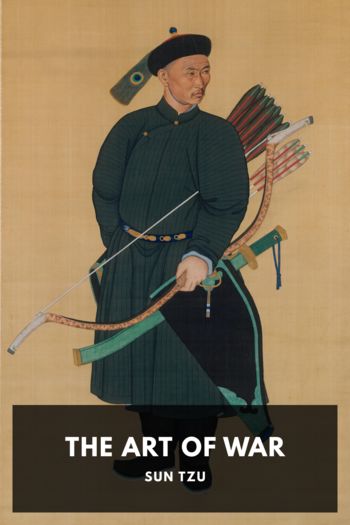The Art of War, Sun Tzu [best english books to read for beginners TXT] 📗

- Author: Sun Tzu
Book online «The Art of War, Sun Tzu [best english books to read for beginners TXT] 📗». Author Sun Tzu
Tsʽao Kung makes 大將, understood, the subject of 怒, which seems rather farfetched. Wang Hsi’s note is: 謂將怒不以理且不知裨佐之才激致其兇懟如山之崩壞也 “This means, the general is angry without just cause, and at the same time does not appreciate the ability of his subordinate officers; thus he arouse fierce resentment and brings an avalanche of ruin upon his head.” He takes 能, therefore, in the sense of 才; but I think that Chʽên Hao is right in his paraphrase 不顧能否 “they don’t care if it be possible or no.” My interpretation of the whole passage is that of Mei Yao-chʽên and Chang Yü. Tu Mu gives a long extract from the Tso Chuan, 宣公, XII 3, showing how the great battle of 邲 Pi (597 BC) was lost for the 晉 Chin State through the contumacy of 先縠 Hsien Hu and the resentful spite of 魏錡 Wei I and 趙旃 Chao Chan. Chang Yü also alludes to the mutinous conduct of 欒黶 Luan Yen (Tso Chuan 襄公, XIV 3). ↩
Wei Liao Tzǔ (ch. 4) says: 上無疑令, 則衆不二聽, 動無疑事, 則衆不二志 “If the commander gives his orders with decision, the soldiers will not wait to hear them twice; if his moves are made without vacillation, the soldiers will not be in two minds about doing their duty.” General Baden-Powell says, italicising the words: “The secret of getting successful work out of your trained men lies in one nutshell—in the clearness of the instructions they receive.”784 Assuming that clear instructions beget confidence, this is very much what Wei Liao Tzǔ (loc. cit.) goes on to say: 未有不信其心而能得其力者也. Cf. also Wu Tzǔ ch. 3: 用兵之害猶豫最大三軍之災生於狐疑 “the most fatal defect in a military leader is diffidence; the worst calamitites that befall an army arise from hesitation.” ↩
史卒皆不拘常度 “Neither officers nor men have any regular routine” (Tu Mu). ↩
Chang Yü paraphrases the latter part of the sentence 不選驍勇之士使為先鋒兵必敗北也, and continues: 凡戰必用精銳為前鋒者一則壯吾志一則挫敵威也 “Whenever there is fighting to be done, the keenest spirits should be appointed to serve in the front ranks, both in order to strengthen the resolution of our own men and to demoralise the enemy.” Cf. the primi ordines of Caesar (De Bello Gallico, V 28, 44 et al.). There seems little to distinguish 北 from 走 above (“Other conditions being equal …”), except that 北 is a more forcible word. ↩
Chʽên Hao makes them out to be: (1) 不量寡衆 “neglect to estimate the enemy’s strength;” (2) 本乏刑德 “want of authority;” (3) 失於訓練 “defective training;” (4) 非理興怒 “unjustifiable anger;” (5) 法令不行 “nonobservance of discipline;” (6) 不擇驍果 “failure to use picked men.” ↩
See supra, “These six are the principles connected with Earth.” ↩
Chia Lin’s text has the reading 易 for 助. Chʽên Hao says: 天時不如地利 “The advantages of weather and season are not equal to those connected with ground.” ↩
The insertion of a “but” is necessary to show the connection of thought here. A general should always utilise, but never rely wholly on natural advantages of terrain. ↩
制勝 is one of those condensed expressions which mean so much in Chinese, and so little in an English translation. What it seems to imply is complete mastery of the situation from the beginning. ↩
The Tʽung Tien and Yü Lan read 計極險易利害遠近. I am decidedly puzzled by Capt. Calthrop’s translation: “an eye for steepness, command and distances.” Where did he find the word which I have put in italics? ↩
A somewhat free translation of 道. As Chang Yü remarks, these are 兵之本 “the essentials of soldiering,” ground being only a helpful accessory. ↩
Cf. chapter VIII, “… commands of the sovereign which must not be obeyed.” Huang-shih Kung of the Chʽin dynasty, who is said to have been the patron of 張良 Chang Liang and to have written the 三略, has these words attributed to him: 出軍行師將在自專進退內御則功難成故聖主明王跪而推轂 “The responsibility of setting an army in motion must devolve on the general alone; if advance and retreat are controlled from the Palace, brilliant results will hardly be achieved. Hence the godlike ruler and the enlightened monarch are content to play a humble part in furthering their country’s cause [lit., kneel down to push the chariot wheel].” This means that 閫外之事將軍裁之 “in matters lying outside the zenana, the decision of the military commander must be absolute.” Chang Yü also quotes the saying: 軍中不聞天子之詔 “Decrees of the Son of Heaven do not penetrate the walls of a camp.” Napoleon, who has been accused of allowing his generals too little independence of action, speaks in the same sense: “Un général en chef n’est pas à couvert de ses fautes à la guerre par un ordre de son souverain ou du ministre, quand celui qui le donne est éloigné





Comments (0)